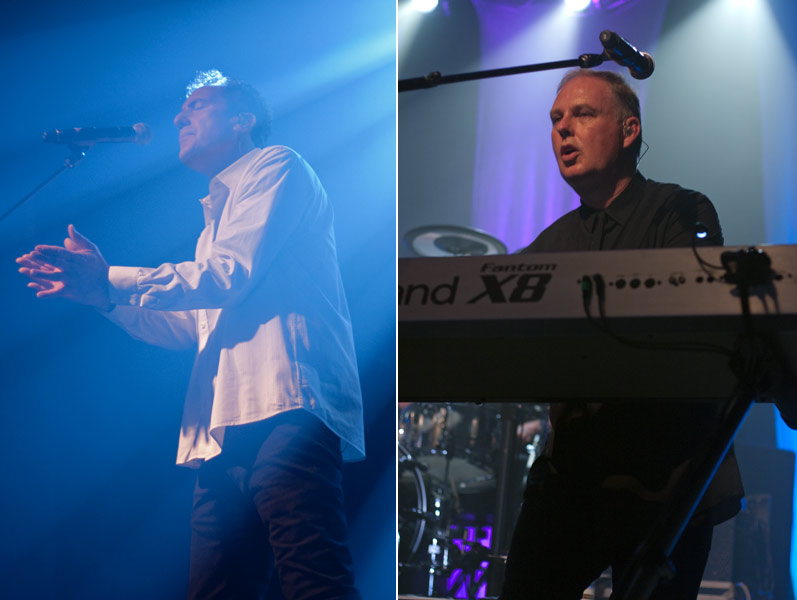
Irving Plaza, New York, September 21
by Stephen Slaybaugh
It’s no surprise that looking back retroactively that the ’80s have been both regaled and debased, often times for practically the same reasons. Musically, the period is frequently remembered as a time of plasticity when bands concocted candy-coated pop from synthetic means while presenting a visual affront just as DayGlo bright. Indeed, it’s hard not to hear something like Missing Persons or Naked Eyes without cringing a little bit.
But while the decade may be largely associated with new wave ephemeralness, the ’80s’ initial years were in fact characterized by an explosion of creativity spurred by the aftereffects of punk. Synthesizers were seen as serious instruments of the future and not just the tools of novelty acts. So while American audiences probably best remember the band for “If You Leave” and a small string of subsequent hits late in the decade, Orchestral Manoeuvres in the Dark were very much a part of that vanguard when they released their first single, “Electricity,” on Factory Records in 1979.
Most of those in attendance at the second of OMD’s two-night stand at Irving Plaza, though, seemed completely aware of the group’s multi-faceted career, as they showed equal excitement for “Stanlow,” the “love song to an oil refinery,” as singer and intermittent bassist Andy McCluskey put it, from their second album, Organisation, that opened the set following the initial chimes of “Dazzle Ships,” as “If You Leave,” which they played mid-set instead of leaving it for the encore as might have been expected.
Indeed, there was a lot to be excited about. They were promoting an excellent record, last year’s History of Modern, which had brought McCluskey and Paul Humphries, OMD’s two principal members who parted ways in the ’90s, back together as well as reunited them with original drummer Malcolm Holmes, who had left the fold in 1986, and keyboardist Martin Cooper, who was with them for most of the ’80s and played on such benchmark records as Architecture and Morality. That record was well-represented, with “Souvenir” and “Joan of Arc,” which were played one after another, being some of the highlights. In fact, every facet of OMD’s catalog was represented, with even “Sailing on the Seven Seas,” from Sugar Tax, one of the albums McCluskey made under the OMD name without Humphries, being played. Hits like “So In Love” and “(Forever) Live and Die” seemed to take on greater resonance decades removed from their creational period, though McCluskey seemed to acknowledge the datedness of the keyboard on the latter with his facial expressions. Most of the time, though, he moved manically about the stage, not so much dancing, but jerking his body in time to the music. Even when playing bass on songs like “Enola Gay,” which closed their set proper, he bounded around with a contagious enthusiasm.
In fact, there were few moments where the show ebbed, the set either propelled by pure energy or aesthetic pleasure. But OMD’s best work remains those early records, when they were clearly looking to colonize new sounds. As such “Statues,” with its cooing synths, and “Messages,” with its motorik beat, chirping keys, and McCluskey’s wavering vocal lines about communication breakdowns, stood out as great examples’ of the group’s modernistic approach. But of course, the performance still peaked when OMD came to “Electricity,” their lead single that capped off their encore and the night. That song’s seemingly steam-powered beats and twinkling keyboard melody still sound as fresh and contemporary now that they’re 30-some years old. Fortunately, on the whole, the same could be said for OMD.
!!! Live Review
1991: The Year Punk Broke
September Festival Guide
The Jesus Lizard, Club
Retromania
Paul McCartney and The Kills Live Reviews
Mid-Summer Festival Guide
Tedeschi Trucks Band Live Review
Wild Nothing and Twin Sister Live Review
Fungi Girls Live Review
Bob Mould, See a Little Light
Are We Still Rolling?
Northside Festival
The Indie Rock Poster Book
